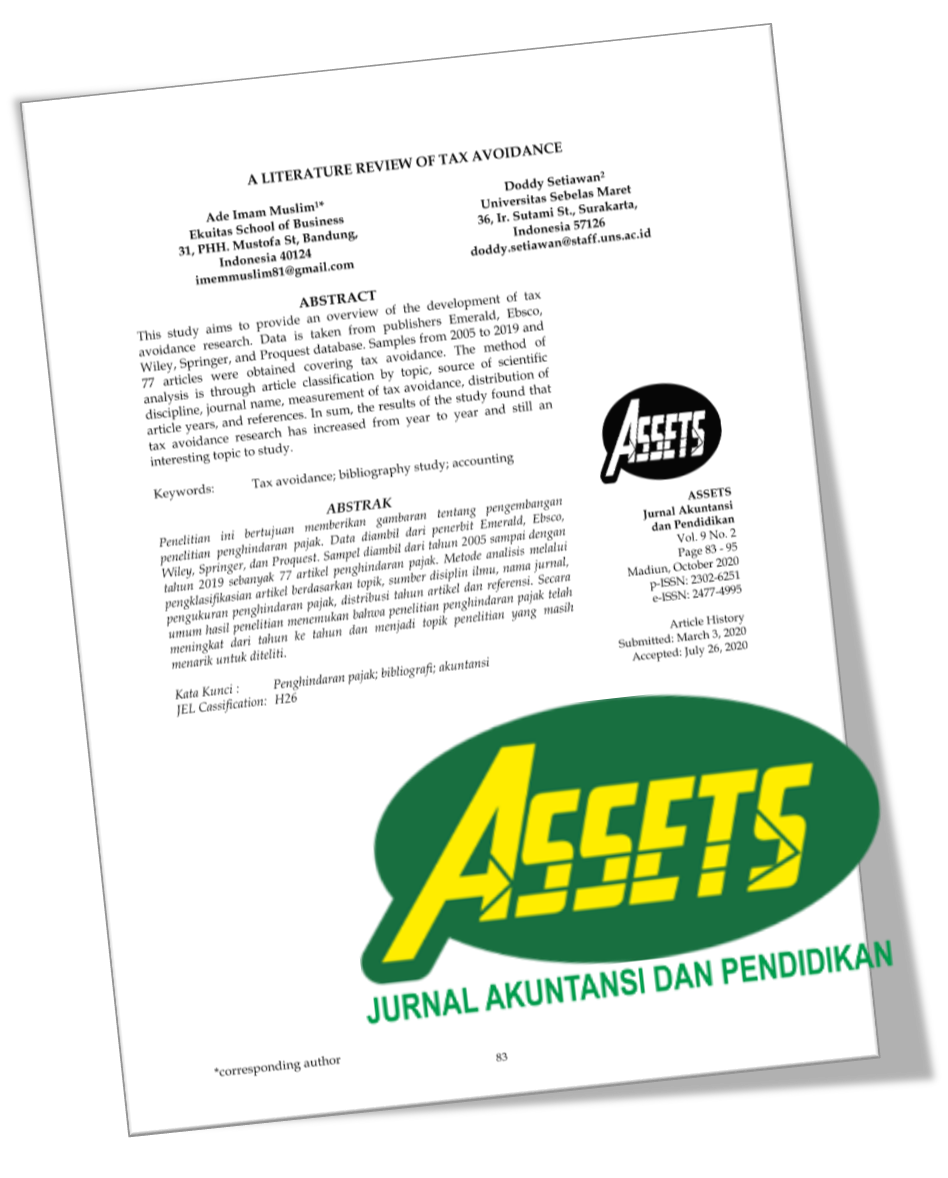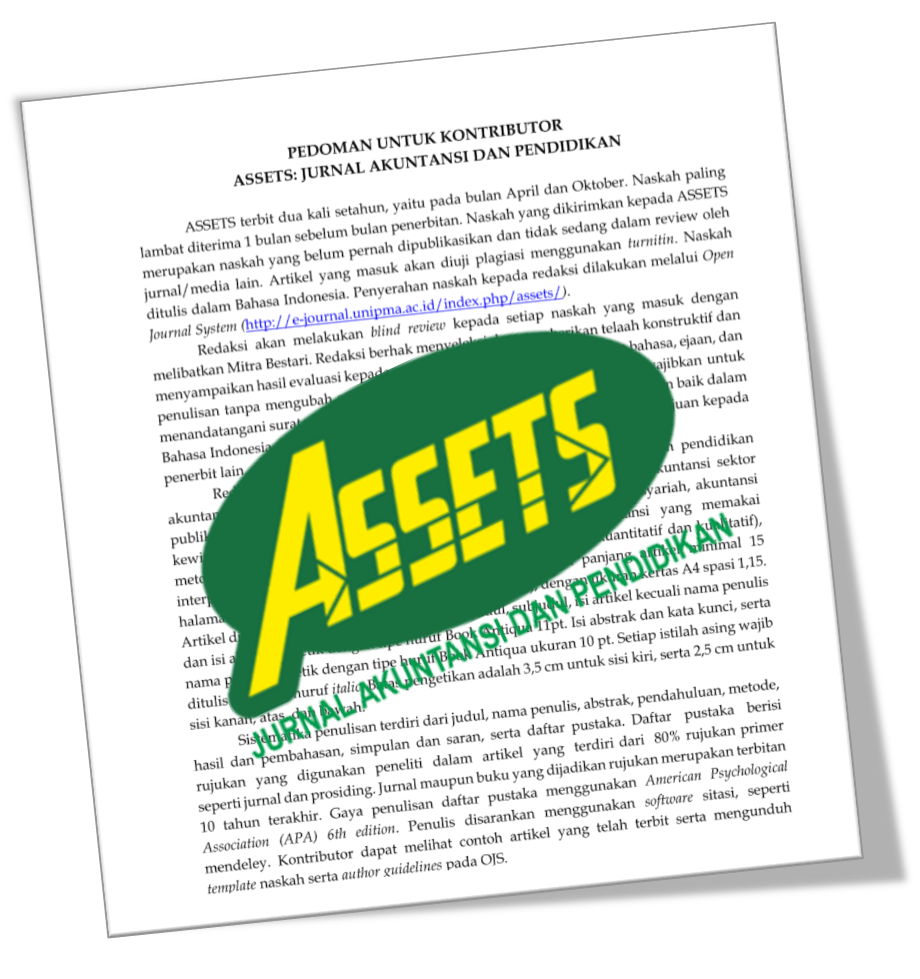THE EFFECT OF SELF-CONTROL AND SITUATIONAL PRESSURE ON THE TENDENCY TO COMMIT ACADEMIC FRAUD
DOI:
https://doi.org/10.25273/jap.v11i2.12214Keywords:
Academic Fraud, Self-Control, Situational Pressure, Kecurangan Akademik, Kontrol Diri, Tekanan Situasional,Abstract
ABSTRACT
TThe spread of the Covid-19 virus in Indonesia in early 2020 changed the form of learning at various levels of education. Initially, learning is done face-to-face, then replaced with online learning (e-learning). It leads to a change in pressure that triggers an increase in the number of academic frauds. However, other elements, such as a person’s level of self-control, can play a role in academic fraud. Therefore, this study aimed to determine how situational pressures and self-control affected the propensity for academic fraud. The study used a 2x2 factorial experimental design with a sample of 80 students. According to the study’s findings, a person’s ability to self-control affects their propensity to cheat in exams. Second, situational pressures affect the propensity to commit academic fraud. Third, neither self-control nor situational stress is related to the tendency to commit academic fraud.Â
ABSTRAK
Sejak terjadi penyebaran virus Covid-19 di Indonesia pada awal 2020 lalu, terjadi perubahan bentuk pembelajaran di berbagai jenjang pendidikan. Semula pembelajaran dilakukan secara tatap muka, kemudian digantikan dengan pembelajaran secara daring (e-learning). Hal tersebut menyebabkan terjadinya perubahan tekanan yang memicu peningkatan angka kecurangan akademik. Namun, terdapat faktor lain yang turut menimbulkan tindakan kecurangan akademik, yaitu tingkat kontrol diri yang dimiliki seseorang. Oleh karena itu, penelitian ini dilakukan dengan tujuan untuk mengetahui pengaruh kontrol diri dan tekanan situasional terhadap tendensi untuk melakukan kecurangan akademik. Penelitian ini menggunakan desain eksperimen faktorial 2x2 dengan sampel sebanyak 80 mahasiswa. Berdasarkan hasil penelitian ini, diketahui bahwa: perbedaan tingkat kontrol diri seseorang mempengaruhi tendensi untuk melakukan kecurangan akademik; kehadiran tekanan situasional berpengaruh terhadap tendensi untuk melakukan kecurangan akademik; tidak terdapat hubungan antara kontrol diri dan tekanan situasional terhadap tendensi untuk melakukan kecurangan akademik.
Downloads
References
Albrecht, S., Howe, K., & Romney, M. (1984). Deterring fraud: the internal auditor’s perspective. In Institute of Internal Auditors Research Foundation.
Ampuni, S., Kautsari, N., Maharani, M., Kuswardani, S., & Buwono, S. B. S. (2020). Academic Dishonesty in Indonesian College Students: an Investigation from a Moral Psychology Perspective. Journal of Academic Ethics, 18(4), 395–417. https://doi.org/10.1007/s10805-019-09352-2
Apriani, N., Sujana, E., & Sulindawati, I. G. E. (2017). Pengaruh pressure, opportunity, dan rationalization terhadap perilaku kecurangan akademik (Studi empiris : Mahasiswa akuntansi program S1 Universitas Pendidikan Ganesha). 7(1).
Ariyanto, D., Firdaus, G. M., Sari, M. M. R., Dewi, A. A., & Made Gilang Jhuniantara, I. (2020). How self control and situational pressure influence the tendency to receive gratification: An experimental study. International Journal of Criminology and Sociology, 9, 400–414. https://doi.org/10.6000/1929-4409.2020.09.39
Błachnio, A., Cudo, A., Kot, P., Torój, M., Oppong Asante, K., Enea, V., … Wright, M. F. (2021). Cultural and psychological variables predicting academic dishonesty: a cross-sectional study in nine countries. Ethics and Behavior, 00(00), 1–46. https://doi.org/10.1080/10508422.2021.1910826
Burt, C. H. (2020). Self-control and crime: Beyond Gottfredson & Hirschi’s theory. Annual Review of Criminology, 3, 43–73. https://doi.org/10.1146/annurev-criminol-011419-041344
Curtis, G. J., Cowcher, E., Greene, B. R., Rundle, K., Paull, M., & Davis, M. C. (2018). Self-control, injunctive norms, and descriptive norms predict engagement in plagiarism in a theory of planned behavior model. Journal of Academic Ethics, 16(3), 225–239. https://doi.org/10.1007/s10805-018-9309-2
Desai, N., Dalal, S., & Rawal, S. (2018). The effects of volunteerism on self-aeception and locus of control. Voluntas, 29(1), 83–92. https://doi.org/10.1007/s11266-017-9857-x
Dorminey, J., Scott Fleming, A., Kranacher, M. J., & Riley, R. A. (2012). The evolution of fraud theory. Issues in Accounting Education, 27(2), 555–579. https://doi.org/10.2308/iace-50131
Ednadita, G., Octavia, S., Khairunnisa, F. S., Rodhiyah, I., & Hendraputra, D. (2020). Effects of self-control on cheating among Indonesian college students. Indonesian Psychological Research, 2(2), 87–95. https://doi.org/10.29080/ipr.v2i2.246
El-Seoud, M. S. A., Taj-Eddin, I. A. T. F., Seddiek, N., El-Khouly, M. M., & Nosseir, A. (2014). E-learning and students’ motivation: A research study on the effect of e-learning on higher education. International Journal of Emerging Technologies in Learning, 9(4), 20–26. https://doi.org/10.3991/ijet.v9i4.3465
Fisher, K. (2015). The psychology of fraud: What motivates fraudsters to commit crime? SSRN Electronic Journal. https://doi.org/10.2139/ssrn.2596825
Gottfredson, M. R., & Hirschi, T. (1990). A General Theory of Crime. Stanford CA: Stanford University Press.
Harususilo, Y. E. (2020). Angka plagiarisme naik, apa pentingnya jadi mahasiswa berintegritas? Retrieved from Kompas.com website: https://www.kompas.com/edu/read/2020/12/07/093751071/angka-plagiarisme-naik-apa-pentingnya-jadi-mahasiswa-berintegritas?page=all
Haziq, M. A., Rossli, K., & Muhammad, E. K. G. (2021). Determinants of academic fraud in higher education institutions: A fraud triangle perspective. Psychology and Education Journal, 58(2), 3879–3892. https://doi.org/10.17762/pae.v58i2.2653
Jereb, E., Perc, M., Lämmlein, B., Jerebic, J., Urh, M., Podbregar, I., & Šprajc, P. (2018). Factors influencing plagiarism in higher education: A comparison of German and Slovene students. PLoS ONE, 13(8), 1–16. https://doi.org/10.1371/journal.pone.0202252
Kasih, A. P. (2020). Kurangi potensi mahasiswa plagiat tugas selama PPJ, ini strategi UPH. Retrieved from Kompas.com website: https://www.kompas.com/edu/read/2020/11/26/132656671/kurangi-potensi-mahasiswa-plagiat-tugas-selama-ppj-ini-strategi-uph?page=all#page2
Lambert, E. G., Hogan, N. L., & Barton, S. M. (2003). Collegiate academic dishonesty revisited: What have they done, how often have they done it, who does it, and why did they do it? Electronic Journal of Sociology, 7(4), 1–28. Retrieved from https://sociology.lightningpath.org/ejs-archives/vol7.4/lambert_etal.html
Nurkhin, A., Muhsin, & Kardoyo. (2018). What determinants of academic fraud behavior ? From fraud triangle to fraud pentagon perspective. 2018, 154–167. https://doi.org/10.18502/kss.v3i10.3126
Puspasari, N. (2015). Fraud theory evolution and its relevance to fraud prevention in the village government in Indonesia. Asia Pacific Fraud Journal, 1(2), 177. https://doi.org/10.21532/apfj.001.16.01.02.15
Putra, I. P. (2021). Mahasiswa kerap plagiat selama kuliah daring, dosen diminta lebih teliti. Retrieved from medcom.id website: https://www.medcom.id/pendidikan/berita-kampus/akWxoVBK-mahasiswa-kerap-plagiat-selama-kuliah-daring-dosen-diminta-lebih-teliti
Santoso, A., & Cahaya, F. R. (2019). Factors influencing plagiarism by accounting lecturers. Accounting Education, 28(4), 401–425. https://doi.org/10.1080/09639284.2018.1523736
Savilia, L., & Laily, N. (2020). Accounting students’ academic fraud: Empirical evidence from Indonesia. Journal of Accounting and Business Education, 5(September), 38–53. https://doi.org/http://dx.doi.org/10.26675/jabe.v5i1.12569
Sekaran, U., & Bougie, R. (2016). Research Methods for Business.
Sugiyono. (2018). Metode Penelitian Kuantitatif Kualitatif dan R&D. Jakarta: Alfabeta.
Tremayne, K., & Curtis, G. J. (2021). Attitudes and understanding are only part of the story: self-control, age and self-imposed pressure predict plagiarism over and above perceptions of seriousness and understanding. Assessment and Evaluation in Higher Education, 46(2), 208–219. https://doi.org/10.1080/02602938.2020.1764907
Williams, M. W. M., & Williams, M. N. (2012). Academic Dishonesty, Self-Control, and General Criminality: A Prospective and Retrospective Study of Academic Dishonesty in a New Zealand University. Ethics and Behavior, 22(2), 89–112. https://doi.org/10.1080/10508422.2011.653291
Winardi, R. D., Mustikarini, A., & Anggraeni, M. A. (2017). Academic dishonesty among accounting students: Some Indonesian evidence. Jurnal Akuntansi Dan Keuangan Indonesia, 14(2), 142–164. https://doi.org/10.21002/jaki.2017.08
Downloads
Additional Files
Published
Issue
Section
License
Perjanjian Lisensi dan Hak Cipta
Saat mengirimkan naskah ke jurnal, penulis menyatakan bahwa:
- Mereka diberi wewenang oleh rekan penulisnya untuk masuk ke dalam perjanjian ini.
- Karya yang dimaksud belum pernah diterbitkan secara resmi sebelumnya, kecuali dalam bentuk abstrak atau sebagai bagian dari kuliah, resensi, tesis, atau overlay jurnal yang diterbitkan.
- Karya yang dimaksud tidak sedang dipertimbangkan untuk diterbitkan di tempat lain,
- Publikasi karya yang dimaksud telah disetujui oleh semua penulis dan oleh otoritas yang bertanggung jawab - secara tahu sama tahu atau eksplisit - dari lembaga tempat pekerjaan itu dilakukan.
- Mereka mengamankan hak untuk mereproduksi materi apa pun yang telah diterbitkan atau dilindungi hak cipta di tempat lain.
- Mereka menyetujui lisensi dan perjanjian hak cipta berikut.
Hak Cipta
Penulis yang menerbitkan dengan ASSETS: Jurnal Akuntansi dan Pendidikan menyetujui persyaratan berikut:
- Penulis mempertahankan hak cipta dan memberikan jurnal hak publikasi pertama dengan karya yang secara bersamaan dilisensikan di bawah Lisensi Atribusi Creative Commons (CC BY-SA 4.0) yang memungkinkan orang lain untuk berbagi karya dengan pengakuan kepenulisan karya dan publikasi awal di jurnal ini.
- Penulis dapat masuk ke dalam pengaturan kontrak tambahan yang terpisah untuk distribusi non-eksklusif dari versi jurnal yang diterbitkan dari karya tersebut (misalnya, mempostingnya ke repositori institusional atau menerbitkannya dalam sebuah buku), dengan pengakuan publikasi awalnya di jurnal ini.
- Penulis diizinkan dan didorong untuk memposting karya mereka secara daring (misalnya di repositori institusional atau di situs web mereka) sebelum dan selama proses pengiriman, karena dapat menghasilkan pertukaran yang produktif, serta kutipan lebih awal dan lebih besar dari karya yang diterbitkan.
License and Copyright Agreement
In submitting the manuscript to the journal, the authors certify that:
- Their co-authors authorize them to enter into these arrangements.
- The work described has not been formally published before, except as an abstract or part of a published lecture, review, thesis, or overlay journal.
- That it is not under consideration for publication elsewhere,
- That its publication has been approved by all the author(s) and by the responsible authorities – tacitly or explicitly – of the institutes where the work has been carried out.
- They secure the right to reproduce any material already published or copyrighted elsewhere.
- They agree to the following license and copyright agreement.
Copyright
Authors who publish with ASSETS: Jurnal Akuntansi dan Pendidikan agree to the following terms:
- Authors retain copyright and grant the journal right of first publication with the work simultaneously licensed under a Creative Commons Attribution License (CC BY-SA 4.0) that allows others to share the work with an acknowledgment of the work's authorship and initial publication in this journal.
- Authors can enter into separate, additional contractual arrangements for the non-exclusive distribution of the journal's published version of the work (e.g., post it to an institutional repository or publish it in a book), with an acknowledgment of its initial publication in this journal.
- Authors are permitted and encouraged to post their work online (e.g., in institutional repositories or on their website) before and during submission, as it can lead to productive exchanges and earlier and more extraordinary citations of published work.

ASSETS: Jurnal Akuntansi dan Pendidikan is licensed under a Creative Commons Attribution-ShareAlike 4.0 International License.










